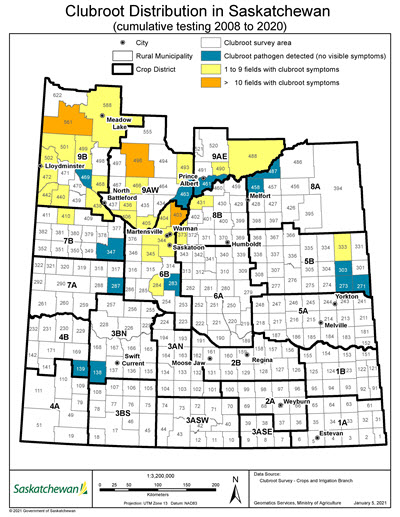Akhavan is the provincial specialist in plant disease with the Saskatchewan Ministry of Agriculture based in Regina.
Clubroot is slowly spreading in the province, but we still have a low number of fields infected compared to Alberta, said Akhavan.
“What is scary is if we look at the situation of clubroot in our neighbouring province of Alberta, which has now more than 3,000 already known infected clubroot fields. Compared to them, we have a very low number of fields,” Akhavan told Farms.com. “Saskatchewan is in a very good position to manage the disease.”
The ministry puts out this map each year to help producers be aware of the risk in their area and manage accordingly as their RM may change on the map, said Akhavan.
 “If a producer sees that the RM is now changed to be coloured blue, yellow or orange, then that means they need to think proactively on their own fields to have these practices of clubroot management in effect,” he said.
“If a producer sees that the RM is now changed to be coloured blue, yellow or orange, then that means they need to think proactively on their own fields to have these practices of clubroot management in effect,” he said.
Since clubroot can spread exponentially without proper management, producers can use practices such as crop rotation, using a clubroot resistant variety of canola and good sanitization practices of equipment, shoes and anything else that may enter an infected field, said Akhavan.
In 2020, the ministry and Sask Canola offered producers the opportunity to test their soil for clubroot. Sask Canola covered the cost and the Saskatchewan Association of Rural Municipalities (SARM) assisted in distribution of the soil bags.
Last year, Discovery Seed Labs tested 231 soil bags for the clubroot pathogen and 11 returned positive results.
“It’s important that farmers test their soils and send the soil bags to the lab to be tested, then they know if the pathogen is there,” said Akhavan. “Finding the DNA of the pathogen in a field has no regulatory consequences. So, it's good information for the producer. The producer can implement management to keep the pathogen low and avoid the actual disease from happening and avoid associated yield loss.”
If a producer wants to know more information about clubroot in their RM, they can reach out to the ministry, Sask Canola or a local SARM plant health officer.
Photo credit: Canola Council of Canada photo